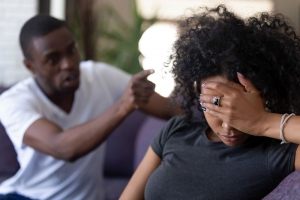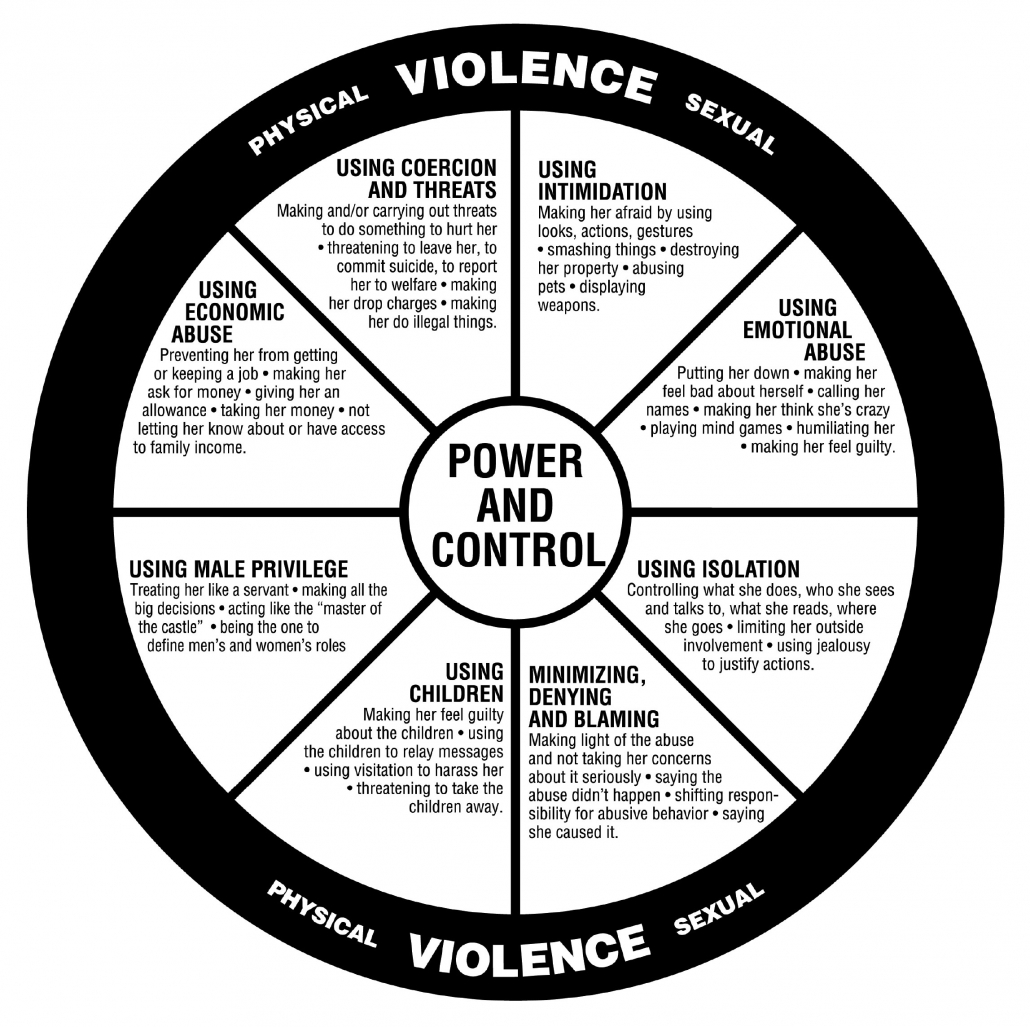Will the abuse ever end? Probably not

The abuse begins subtly … he doesn’t like some of your friends and doesn’t want you seeing them … The abuse increases in frequency … he discourages you from seeing your friends and family, he wants to know why you are spending so much time on your phone or computer, he questions your whereabouts, and he begins verbally or physically abusing you. He may even blame you for his outbursts.
Abusers are master manipulators, and their relationship with their partner centers around control and power. Victims may not see this domination initially.
Is there a typical abuser?
Our culture teaches us that domestic, or intimate partner, violence is physical. It may be accompanied by demeaning words, but it becomes abuse when it becomes physical. Our culture also teaches us that only men abuse, and that they only abuse women. None of that is accurate. Anyone can be an abuser, and the abuser may not use physical force. Every relationship is different, but the common thread of domestic violence is the desire to control the victim, maintain power in the relationship, and assume the position of superiority.
Abusers are not easy to spot. Publicly, they seem smart, trustworthy, loving and charming but privately, they are hurting their partner mentally, physically and financially and emotionally.
Most, but not all, people who experience intimate partner violence are women. Most, but not all, abusers are men. Abuse can happen in straight, gay and lesbian relationships. Gay and bisexual men and women are more likely to experience domestic and sexual violence than their straight counterparts, and transgender people experience some of the highest rates of domestic violence .
In the majority of abusive relationships, the abuse starts slowly and worsens over time. Abusers may wait until they have clear leverage over their partner. They may wait for a shared commitment that solidifies the relationship (eg, marriage or pregnancy).
In many cases, victims do not recognize they are in an abusive relationship, even though many of the following warning signs are present:
- He calls you names, insults you and demeans you.
- He prevents you from seeing friends and may even discourage you from working.
- He takes away your access to money, credit cards or a car.
- He constantly accuses you of being unfaithful.
- He monitors your social media activity and checks your emails, answers your cell phone and listens to your phone conversations.
- He forces you to have sex with him when you don’t want to.
- He blames you for his violent behavior and tells you that you deserve it.
- He strips away your other relationships, making you more dependent on him and leaving you with no support system.
Why do victims stay in the relationship?
Survivors have many reasons to stay with the abuser. One reason is dependency. The abuser controls the victim, shames her, destroys her self-esteem and confidence, and isolates her from family and friends, creating more dependency on her abuser.
Here are a few more:
- She has no money, nowhere to live, and no outside emotional support.
- If kids are involved, she worries about taking the children away from their father, and she also worries about their safety and security.
- She has hope the abuser will change. The couple once had a loving relationship, maybe in time this will be restored, the victim rationalizes.
- Abusers can have a Jekyll-and-Hyde personality. Dr. Jekyll is often charming and romantic, and makes pronouncements of love. Victims love Dr. Jekyll and make excuses for Mr. Hyde.
- It can be very difficult for survivors to identify what is going on. Doing so might force them to acknowledge pain they have been trying to avoid.
- The abuser hides his motives behind time or substance use. The survivor often make excuses for the abuser … “he only hits me when he drinks …” or he will tell the victim … “I will change, I just need a little more time …”
The abuser has power and control over the victim, and he is not going to let it go voluntarily. He tosses a carrot to the survivor to get her to stay, often blaming her …” if you would stop spending so much money, I wouldn’t hurt you.”
His emotional manipulation is sneaky and calculated, and his financial manipulation traps the victim. She has diminished self-worth, anxiety, depression and a general feeling of helplessness, making it even more challenging to walk out.
Leaving is complicated
Telling a victim to leave is not helpful advice. To leave, the survivor needs to acknowledge the relationship is abusive, and also needs a window of opportunity, a safe place to go, and money to support herself and any dependents. She also will need mental health support.
Counseling is critical
Survivors of domestic violence can heal with professional help.
A huge step for a survivor of domestic violence is to seek therapy. This means she has taken the first big leap … she has realized that she is in an abusive relationship and wants help. The survivor has done a lot of work to get to this point; she finally realizes her life is being destroyed and she has found the strength and the resources to ask for help.
In therapy, we start identifying the ways in which her life has changed because of the abuse. She may have changed how she thinks about herself, her loved ones and the world around her to survive the relationship
Survivors gradually can work to rebuild the self-esteem that was damaged in the relationship. Developing a support system, practicing self-care, and talking about the experience with a mental health professional will help in the healing process.
A resource I like to use in therapy is the Duluth Model of Power and Control, which shows the many ways in which a victim is abused. The Power and Control Wheel, as it is called, is the result of years of research to identify the most common abusive behaviors used against women. The wheel is used to help survivors see the tactics used against them and begin to understand how their abuser was able to exert so much control over them. The focus of the wheel is on the experiences of women abused by men, but all survivors of domestic abuse may relate to it.

What about the abuser?
Abusers don’t become abusers spontaneously. They receive messages throughout their life – from their environment, their family, their friends, their social networks – and they model that behavior. In some families, boys learn at a young age that if someone – especially a romantic partner – hurts or embarrasses them, they have to hurt them back. Don’t cry, don’t look scared, retaliate. Achieving power and control in their relationship is the norm for them. They don’t want to give it up because it equals strength and self-worth.
Abusers can have many common traits:
- Insecurity
- Unrealistic expectations of a relationship
- Distrust
- Jealousy
- Need to be right
- Possessiveness
- Aggressiveness
- Blames their behavior on others
Can abusive behavior change?
Yes, but it is a very long, tedious process, and the abuser must want to change. He must make fundamental changes to his perspective on the world. But first, he must stop denying there is a problem. He must take responsibility for his abusive behavior.
Do not expect the abuser to change without the unconditional end of the abusive relationship. As long as the abuser has a partner to control or loved ones who believe he is innocent, he has powerful incentives not to change.
In conclusion, domestic, or intimate partner, violence is a violation of our basic expectations in a relationship – caring, respect, love and trust. Rebuilding these in a relationship damaged by domestic violence is extremely difficult. Both parties can heal, but in almost all cases, the couple finds it is best to move on separately.
If you know someone who is in an abusive relationship, don’t press too hard; you risk driving her back to her abuser, alienating her, or the abuser will find out and the abuse getting worse. Be there when the survivor is ready to talk or leave; that is when she will need your support the most.
If you, or someone you know, is in imminent danger from domestic or intimate partner violence, the following resources may be helpful:
Oakland County
- Haven 24-hour Crisis & Support: 248-334-1274 | Toll-Free Crisis Line: 877-922-1274
Wayne County
- First Step 24-hour Help Line: 734-722-6800
- OneEighty 24-hour Hotline Domestic Violence / Sexual Assault: 1-800-686-1122
Some alarming statistics on domestic violence
- On an average, nearly 20 people per minute in the US are physically abused by an intimate partner. This equals more than 10 million men and women.
- One in three women and one in four men have experienced some form of physical violence by an intimate partner.
- One in four women and one in seven men have been victims of severe physical violence (eg, beating, burning, strangling) by an intimate partner.
- One in 10 women have been raped by an intimate partner.
- The presence of a gun in a domestic violence situation increases the risk of homicide by 500 percent.
- Only 34 percent of people who are injured by intimate partners receive medical care for their injuries.
- In Michigan, 36 percent of women have experienced domestic violence.
- On a typical day, more than 20,000 calls are made to domestic violence hotlines nationwide.
(Source: National Coalition Against Domestic Violence)
